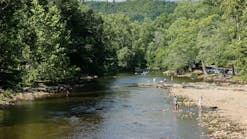LEMONT, IL, APRIL 13, 2020 -- A U.S.-Israel team that includes researchers from the U.S. Department of Energy's (DOE) Argonne National Laboratory has received $21.4 million over five years from DOE's Office of International Affairs and Israel's Ministry of Energy to develop new technologies to help solve global water challenges.
Northwestern University and BGN Technologies, the technology transfer company of Ben-Gurion University of the Negev (BGU), will lead the multi-institutional effort, known as the Collaborative Water-Energy Research Center (CoWERC). The CoWERC center is part of The Energy Centers program, which is administered by the Binational Industrial Research Foundation (BIRD).
"Argonne's capabilities in materials research for water applications, from discovery to scale-up, will be key to delivering on CoWERC's mission,” said Seth Darling, director, Argonne's Center for Molecular Engineering.
Increasing water stress around the globe is among the greatest challenges we will face this century, threatening all sectors of society. New technologies are sorely needed to expand supplies of clean water. Working at the intersection of water and energy, the team will research, develop and commercialize new high-performance methods for water desalination, purification and reuse. After being validated in the U.S. and Israel, the new technologies could potentially be implemented around the world.
CoWERC will focus on three areas of technology development: energy-efficient enhanced water supply, wastewater reuse and resource recovery, and energy-water systems. Technology development efforts will culminate in pilot testing at water and wastewater infrastructure facilities in both Israel and the U.S.
"Water and energy are inextricably linked: water purification and distribution are primary uses of energy, while water is essential for energy production," said Aaron Packman, who directs Northwestern's Center for Water Research. "CoWERC will enable us to develop new technologies that will reduce the energy needed for desalination, improve recovery of water and energy, and support safe water reuse."
"We can actually extract more energy from urban wastewater than the amount theoretically needed for its purification," said Moshe Herzberg, professor of environmental engineering at the Zuckerberg Institute for Water Research at BGU. "Therefore, our aim is to recover and conserve this energy as well as to recover the nutrients and reuse the treated water."
CoWERC members are pursuing six projects: (1) high-recovery ion-selective desalination; (2) selective and antifouling materials; (3) biotechnology for nutrient and energy recovery; (4) efficient trace organic pollutant removal; (5) low-energy water reuse; and (6) energy-water systems analysis.
"Argonne's capabilities in materials research for water applications, from discovery to scale-up, will be key to delivering on CoWERC's mission" according to Seth Darling, who directs Argonne's Center for Molecular Engineering and will lead the selective and antifouling materials project within CoWERC.
The highly collaborative consortium includes partners from universities, industry and government, including Argonne, Yale University, Technion, DuPont Water Solutions, Evoqua Water Technologies, Fluence Corporation, Mekorot, the Metropolitan Water Reclamation District of Greater Chicago, Hampton Roads Sanitation District, CycloPure, AECOM, Anaergia, Current Innovation, Ma'agan Michael and the Galilee Society.
SOURCE: DOE/ARGONNE NATIONAL LABORATORY



